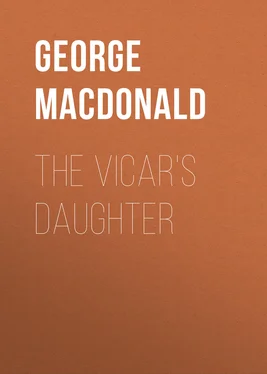George MacDonald - The Vicar's Daughter
Здесь есть возможность читать онлайн «George MacDonald - The Vicar's Daughter» — ознакомительный отрывок электронной книги совершенно бесплатно, а после прочтения отрывка купить полную версию. В некоторых случаях можно слушать аудио, скачать через торрент в формате fb2 и присутствует краткое содержание. Издательство: Иностранный паблик, Жанр: foreign_prose, foreign_religion, foreign_antique, на английском языке. Описание произведения, (предисловие) а так же отзывы посетителей доступны на портале библиотеки ЛибКат.
- Название:The Vicar's Daughter
- Автор:
- Издательство:Иностранный паблик
- Жанр:
- Год:неизвестен
- ISBN:нет данных
- Рейтинг книги:3 / 5. Голосов: 1
-
Избранное:Добавить в избранное
- Отзывы:
-
Ваша оценка:
- 60
- 1
- 2
- 3
- 4
- 5
The Vicar's Daughter: краткое содержание, описание и аннотация
Предлагаем к чтению аннотацию, описание, краткое содержание или предисловие (зависит от того, что написал сам автор книги «The Vicar's Daughter»). Если вы не нашли необходимую информацию о книге — напишите в комментариях, мы постараемся отыскать её.
The Vicar's Daughter — читать онлайн ознакомительный отрывок
Ниже представлен текст книги, разбитый по страницам. Система сохранения места последней прочитанной страницы, позволяет с удобством читать онлайн бесплатно книгу «The Vicar's Daughter», без необходимости каждый раз заново искать на чём Вы остановились. Поставьте закладку, и сможете в любой момент перейти на страницу, на которой закончили чтение.
Интервал:
Закладка:
George MacDonald
The Vicar's Daughter
CHAPTER I.
INTRODUCTORY
I think that is the way my father would begin. My name is Ethelwyn Percivale, and used to be Ethelwyn Walton. I always put the Walton in between when I write to my father; for I think it is quite enough to have to leave father and mother behind for a husband, without leaving their name behind you also. I am fond of lumber-rooms, and in some houses consider them far the most interesting spots; but I don't choose that my old name should lie about in the one at home.
I am much afraid of writing nonsense; but my father tells me that to see things in print is a great help to recognizing whether they are nonsense or not. And he tells me, too, that his friend the publisher, who,—but I will speak of him presently,—his friend the publisher is not like any other publisher he ever met with before; for he never grumbles at any alterations writers choose to make,—at least he never says any thing, although it costs a great deal to shift the types again after they are once set up. The other part of my excuse for attempting to write lies simply in telling how it came about.
Ten days ago, my father came up from Marshmallows to pay us a visit. He is with us now, but we don't see much of him all day; for he is generally out with a friend of his in the east end, the parson of one of the poorest parishes in London,—who thanks God that he wasn't the nephew of any bishop to be put into a good living, for he learns more about the ways of God from having to do with plain, yes, vulgar human nature, than the thickness of the varnish would ever have permitted him to discover in what are called the higher orders of society. Yet I must say, that, amongst those I have recognized as nearest, the sacred communism of the early church—a phrase of my father's—are two or three people of rank and wealth, whose names are written in heaven, and need not be set down in my poor story.
A few days ago, then, my father, coming home to dinner, brought with him the publisher of the two books called, "The Annals of a Quiet Neighborhood," and "The Seaboard Parish." The first of these had lain by him for some years before my father could publish it; and then he remodelled it a little for the magazine in which it came out, a portion at a time. The second was written at the request of Mr. S., who wanted something more of the same sort; and now, after some years, he had begun again to represent to my father, at intervals, the necessity for another story to complete the trilogy , as he called it: insisting, when my father objected the difficulties of growing years and failing judgment, that indeed he owed it to him; for he had left him in the lurch, as it were, with an incomplete story, not to say an uncompleted series. My father still objected, and Mr. S. still urged, until, at length, my father said—this I learned afterwards, of course—"What would you say if I found you a substitute?" "That depends on who the substitute might be, Mr. Walton," said Mr. S. The result of their talk was that my father brought him home to dinner that day; and hence it comes, that, with some real fear and much metaphorical trembling, I am now writing this. I wonder if anybody will ever read it. This my first chapter shall be composed of a little of the talk that passed at our dinner-table that day. Mr. Blackstone was the only other stranger present; and he certainly was not much of a stranger.
"Do you keep a diary, Mrs. Percivale?" asked Mr. S., with a twinkle in his eye, as if he expected an indignant repudiation.
"I would rather keep a rag and bottle shop," I answered: at which Mr. Blackstone burst into one of his splendid roars of laughter; for if ever a man could laugh like a Christian who believed the world was in a fair way after all, that man was Mr. Blackstone; and even my husband, who seldom laughs at any thing I say with more than his eyes, was infected by it, and laughed heartily.
"That's rather a strong assertion, my love," said my father. "Pray, what do you mean by it?"
"I mean, papa," I answered, "that it would be a more profitable employment to keep the one than the other."
"I suppose you think," said Mr. Blackstone, "that the lady who keeps a diary is in the same danger as the old woman who prided herself in keeping a strict account of her personal expenses. And it always was correct; for when she could not get it to balance at the end of the week, she brought it right by putting down the deficit as charity ."
"That's just what I mean," I said.
"But," resumed Mr. S., "I did not mean a diary of your feelings, but of the events of the day and hour."
"Which are never in themselves worth putting down," I said. "All that is worth remembering will find for itself some convenient cranny to go to sleep in till it is wanted, without being made a poor mummy of in a diary."
"If you have such a memory, I grant that is better, even for my purpose, much better," said Mr. S.
"For your purpose!" I repeated, in surprise. "I beg your pardon; but what designs can you have upon my memory?"
"Well, I suppose I had better be as straightforward as I know you would like me to be, Mrs. Percivale. I want you to make up the sum your father owes me. He owed me three books; he has paid me two. I want the third from you."
I laughed; for the very notion of writing a book seemed preposterous.
"I want you, under feigned names of course," he went on, "as are all the names in your father's two books, to give me the further history of the family, and in particular your own experiences in London. I am confident the history of your married life must contain a number of incidents which, without the least danger of indiscretion, might be communicated to the public to the great advantage of all who read them."
"You forget," I said, hardly believing him to be in earnest, "that I should be exposing my story to you and Mr. Blackstone at least. If I were to make the absurd attempt,—I mean absurd as regards my ability,—I should be always thinking of you two as my public, and whether it would be right for me to say this and say that; which you may see at once would render it impossible for me to write at all."
"I think I can suggest a way out of that difficulty, Wynnie," said my father. "You must write freely, all you feel inclined to write, and then let your husband see it. You may be content to let all pass that he passes."
"You don't say you really mean it, papa! The thing is perfectly impossible. I never wrote a book in my life, and"—
"No more did I, my dear, before I began my first."
"But you grew up to it by degrees, papa!"
"I have no doubt that will make it the easier for you, when you try. I am so far, at least, a Darwinian as to believe that."
"But, really, Mr. S. ought to have more sense—I beg your pardon, Mr. S.; but it is perfectly absurd to suppose me capable of finishing any thing my father has begun. I assure you I don't feel flattered by your proposal. I have got a man of more consequence for a father than that would imply."
All this time my tall husband sat silent at the foot of the table, as if he had nothing on earth to do with the affair, instead of coming to my assistance, when, as I thought, I really needed it, especially seeing my own father was of the combination against me; for what can be more miserable than to be taken for wiser or better or cleverer than you know perfectly well you are. I looked down the table, straight and sharp at him, thinking to rouse him by the most powerful of silent appeals; and when he opened his mouth very solemnly, staring at me in return down all the length of the table, I thought I had succeeded. But I was not a little surprised, when I heard him say,—
"I think, Wynnie, as your father and Mr. S. appear to wish it, you might at least try."
Читать дальшеИнтервал:
Закладка:
Похожие книги на «The Vicar's Daughter»
Представляем Вашему вниманию похожие книги на «The Vicar's Daughter» списком для выбора. Мы отобрали схожую по названию и смыслу литературу в надежде предоставить читателям больше вариантов отыскать новые, интересные, ещё непрочитанные произведения.
Обсуждение, отзывы о книге «The Vicar's Daughter» и просто собственные мнения читателей. Оставьте ваши комментарии, напишите, что Вы думаете о произведении, его смысле или главных героях. Укажите что конкретно понравилось, а что нет, и почему Вы так считаете.












